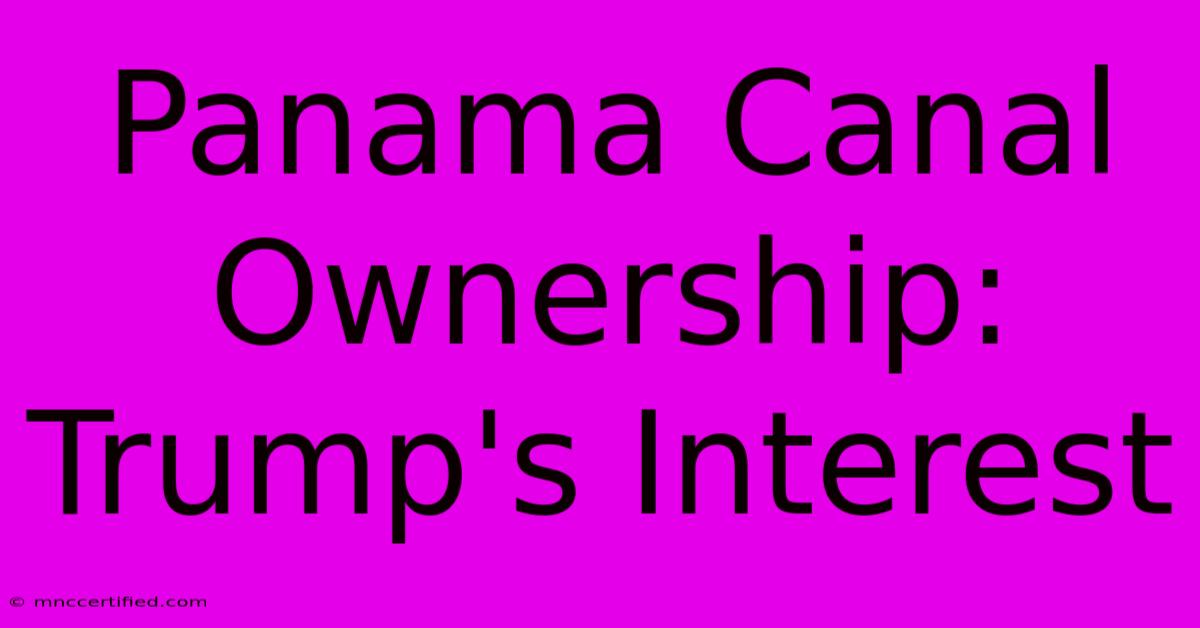Panama Canal Ownership: Trump's Interest

Table of Contents
Panama Canal Ownership: Trump's Interest – Fact vs. Fiction
The Panama Canal, a marvel of engineering connecting the Atlantic and Pacific Oceans, has been a subject of intense geopolitical interest for over a century. Its ownership and control have been points of contention, and former President Donald Trump's pronouncements regarding the canal frequently sparked debate. This article will delve into the facts surrounding Panama Canal ownership and disentangle the reality from the speculation surrounding Trump's purported interest.
Understanding Panama Canal Ownership: A Historical Perspective
The Panama Canal officially belongs to Panama. This is a crucial point, often overlooked amidst political rhetoric. The United States oversaw its construction and controlled the Canal Zone until the Torrijos-Carter Treaties of 1977, which stipulated the transfer of control back to Panama. This transfer was completed on December 31, 1999, marking a significant moment in Panamanian history.
Since then, the Panama Canal Authority (ACP), an autonomous agency of the Panamanian government, has managed and operated the canal. The ACP is responsible for its maintenance, expansion, and overall administration, generating substantial revenue for Panama. This revenue significantly contributes to the Panamanian economy, highlighting the canal's vital role in the nation's prosperity.
The Myth of US Ownership
Despite the historical transfer of control, the misconception that the United States still owns or secretly controls the Panama Canal persists. This notion often fuels political narratives and is occasionally used to bolster arguments about US influence in the region. However, the facts remain clear: Panama holds complete and undisputed sovereignty over the Panama Canal.
Trump's Stances on the Panama Canal: Examining the Claims
During his presidency, Donald Trump made several statements regarding the Panama Canal, some of which raised eyebrows and sparked controversy. While he never explicitly claimed US ownership, his comments often hinted at a desire for greater US influence or control over the vital waterway.
Analyzing his pronouncements requires careful consideration. Some interpreted his words as advocating for renewed US involvement in the canal's management or security, potentially through increased military presence or economic agreements. However, these interpretations were often met with pushback from Panama, which fiercely protects its sovereignty.
Separating Fact from Speculation
It's vital to differentiate between Trump's stated aims and their practical feasibility. While he might have voiced concerns about the canal's security or economic implications for the US, these concerns do not equate to a claim of ownership or a demonstrated attempt to seize control. The Panama Canal's ownership remains firmly in Panamanian hands.
The Geopolitical Significance of the Panama Canal
The Panama Canal's strategic importance continues to be undeniable. Its location makes it a crucial transit route for global trade, impacting shipping costs and supply chains worldwide. This geopolitical significance naturally leads to ongoing discussion about its security and management, drawing attention from various global powers. However, this does not translate into any legitimate challenge to Panamanian ownership.
Conclusion: Panama's Sovereignty Remains Intact
In conclusion, any claims suggesting that the United States, under the Trump administration or otherwise, held or sought to regain ownership or control of the Panama Canal are inaccurate. Panama holds complete and undisputed sovereignty over this vital waterway. While the canal's geopolitical significance ensures it remains a topic of international discussion, the ownership question remains settled: it belongs to Panama. The focus should remain on respectful collaboration and mutual benefit concerning this crucial global asset.

Thank you for visiting our website wich cover about Panama Canal Ownership: Trump's Interest. We hope the information provided has been useful to you. Feel free to contact us if you have any questions or need further assistance. See you next time and dont miss to bookmark.
Featured Posts
-
Squid Game Winners Losers And Deaths
Dec 24, 2024
-
Festivus Traditions And Meaning
Dec 24, 2024
-
Trumps Greenland Offer Rejected
Dec 24, 2024
-
Gaetz Ethics Report 5 Crucial Details
Dec 24, 2024
-
Gaetz Report Sexual Abuse Allegations Revealed
Dec 24, 2024